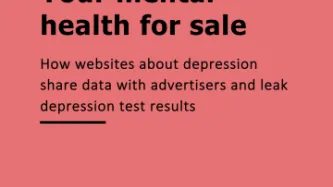Advanced Search
Content Type: Long Read
Privacy and security are both essential to protecting individuals, including their autonomy and dignity. Undermining privacy undermines the security of individuals, their devices and the broader infrastructure. People need privacy to freely secure themselves, their information, and fully enjoy other rights. However, a growing number of governments around the world are embracing hacking to facilitate their surveillance activities.
As a form of government surveillance, hacking presents…
Content Type: Press release
Today, the European Court of Human Rights (ECtHR) has handed down a decision in a case brought by Privacy International and a coalition of internet and communications service providers and campaign groups including the Chaos Computer Club (Germany), GreenNet (UK), Jinbonet (Korea), May First/People Link (US), and Riseup (US) (the “coalition”).
The case challenges the conduct of hacking operations abroad by one of the UK’s intelligence agencies, the Government Communications…
Content Type: News & Analysis
In September 2019, PI published the report Your Mental Health for Sale. Our investigation looked into popular mental health websites and their data sharing practices.
Our findings suggest that, at the time of the research, most websites we looked at were using third party tracking for advertising purposes, sometimes relying on programmatic advertising technologies such as Real Time Bidding (RTB), sharing personal data with potentially thousands of actors. Some websites were also found sharing…
Content Type: Report
The changes discussed in this article are based on a second analysis performed in late November, 3 months after the original study Your Mental Health is for Sale and following the exact same methodology. All data collected can be found at the bottom of this page.
Change is possible
Back in September 2019 we published the report Your Mental Health is for Sale exposing how a majority of the top websites related to mental health in France, Germany and the UK share data for advertising purposes.…
Content Type: Long Read
A new study by Privacy International reveals how popular websites about depression in France, Germany and the UK share user data with advertisers, data brokers and large tech companies, while some depression test websites leak answers and test results with third parties. The findings raise serious concerns about compliance with European data protection and privacy laws.
This article is part of a research led by Privacy International on mental health websites and tracking. Read our…
Content Type: Report
The full report of Privacy International's study on how popular websites about depression in France, Germany and the UK share user data with advertisers, data brokers and large tech companies, while some depression test websites leak answers and test results with third parties. The findings raise serious concerns about compliance with European data protection and privacy laws.
Content Type: News & Analysis
This article is part of a research led by Privacy International on mental health websites and tracking. Read our full report.
According to the World Health Organisation (WHO), 25 percent of the European population suffers from depression or anxiety each year, yet about 50% of major depressions remain untreated. This means that everyday thousands of people are looking for information about depression online. They take tests to find out how serious their symptoms are, they try to access…
Content Type: News & Analysis
Federal law enforcement is deploying powerful computer hacking tools to conduct domestic criminal and immigration investigations.
By Alex Betschen, Student Attorney, Civil Liberties & Transparency Clinic, University at Buffalo School of Law
Hacking by the government raises grave privacy concerns, creating surveillance possibilities that were previously the stuff of science fiction. It also poses a security risk, because hacking takes advantage of unpatched vulnerabilities in our…
Content Type: Press release
FOR IMMEDIATE RELEASE
December 21, 2018
CONTACTS:
Alex Betschen, Civil Liberties & Transparency Clinic, [email protected], 716–531–6649
Colton Kells, Civil Liberties & Transparency Clinic, [email protected], 585–766–5119
Abdullah Hasan, ACLU, [email protected], 646–905–8879
NEW YORK — Privacy International, the American Civil Liberties Union, and the Civil Liberties & Transparency Clinic of the University at Buffalo School of Law filed a lawsuit today…
Content Type: News & Analysis
This piece was originally published on Just Security.
Ten years ago, an FBI official impersonated an Associated Press reporter to lure and track a teenager suspected of sending in prank bomb threats to his school. To find him, the FBI agent, posing as a reporter, sent the teenager links to a supposed story he was working on, but the links were infested with malware that once clicked on quickly exposed the teen’s location. More recently, the FBI has seized and modified websites so…
Content Type: Press release
In a remarkable development in Privacy International's four year legal battle against the UK Government's powers to hack phones and computers on a massive scale, the UK Supreme Court has agreed to hear the London-based charity's case in December 2018.
Privacy International's case stems from a decision by the Investigatory Powers Tribunal (a specialised court set up to hear complaints against government surveillance, including surveillance carried out by the UK intelligence agencies) finding…
Content Type: Long Read
Introduction
A growing number of governments around the world are embracing hacking to facilitate their surveillance activities. Yet hacking presents unique and grave threats to our privacy and security. It is far more intrusive than any other surveillance technique, capable of accessing information sufficient to build a detailed profile of a person, as well as altering or deleting that information. At the same time, hacking not only undermines the security of targeted systems, but also has…
Content Type: Long Read
This piece was orignally published in Slate in February 2017
In 2015, the FBI obtained a warrant to hack the devices of every visitor to a child pornography website. On the basis of this single warrant, the FBI ultimately hacked more than 8,700 computers, resulting in a wave of federal prosecutions. The vast majority of these devices—over 83 percent—were located outside the United States, in more than 100 different countries. Now, we are in the midst of the first cases…
Content Type: Press release
Today, Privacy International, together with five internet and communications providers from around the world, have lodged an application before the European Court of Human Rights to challenge the British Government's use of bulk hacking abroad. Until we brought our original case at the Investigatory Powers Tribunal (IPT) in 2014, the Government had never admitted that it engaged in hacking. Now we are learning for the first time how far-reaching the Government's global hacking capabilities are…
Content Type: Long Read
This piece originally appeared here.
On both sides of the Atlantic, we are witnessing the dramatic expansion of government hacking powers. In the United States, a proposed amendment to Rule 41 of the Federal Rules of Criminal Procedure would permit the government to obtain a warrant, in certain circumstances, to hack unspecified numbers of electronic devices anywhere in the world. Meanwhile, across the pond, the British Parliament is currently debating the Investigatory…
Content Type: Press release
In response to the Investigatory Powers Tribunal (IPT) ruling today that GCHQ's hacking is lawful, we have issued the following press statement:
"We are disappointed by the IPT’s judgment today, which has found Government hacking lawful based on a broad interpretation of a law dating back to 1994, when the internet and mobile phone technology were in their infancy.
Until we brought this case, GCHQ would neither confirm nor deny that it was they were engaging in mass hacking of…
Content Type: Long Read
The Investigatory Powers Tribunal (“IPT”) today held that GCHQ hacking of computers, mobile devices and networks is lawful, wherever it occurs around the world. We are disappointed that the IPT has not upheld our complaint and we will be challenging its findings.
Our complaint is the first UK legal challenge to state-sponsored hacking, an exceptionally intrusive form of surveillance. We contended that GCHQ hacking operations were incompatible with democratic principles and human rights…












